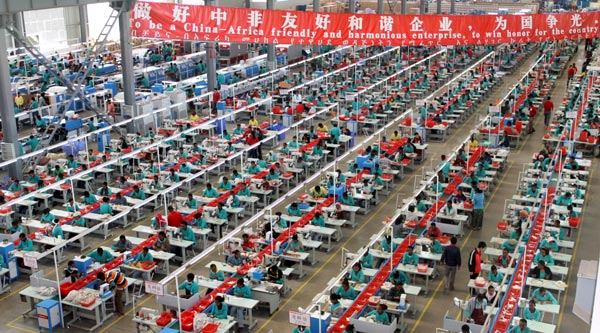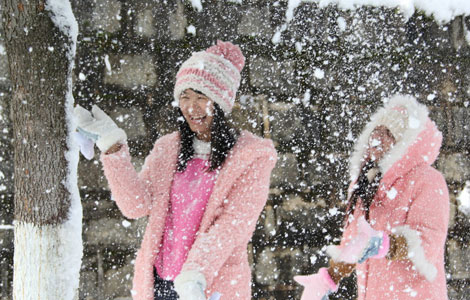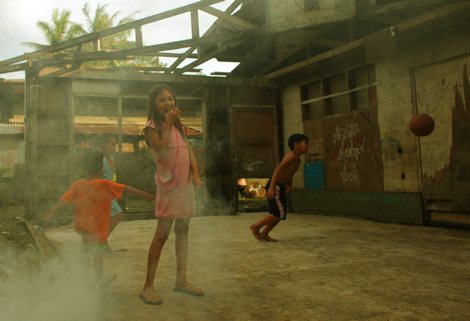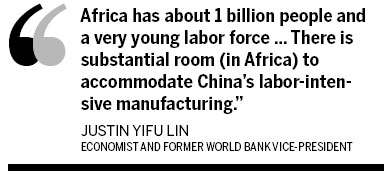Putting best foot forward in Africa
Updated: 2013-12-16 07:45
By Li Wenfang in Guangzhou (China Daily)
|
||||||||
|
 Staff members work at Huajian Group's Ethiopian plant. [Photo / Provided to China Daily]
|
Chinese shoemaker ups investment to create job opportunities in Ethiopia
Chinese footwear maker Huajian Group plans to make Ethiopia the hub for the global footwear industry and create more than 100,000 jobs locally in the next 10 years.
The company, which first moved to Ethiopia to offset rising labor and raw material costs in China, says it has teamed up with the China-Africa Development Fund and the Ethiopian Ministry of Industry to establish a light-manufacturing base in Ethiopia.
To be called the Ethiopia-China Light Manufacturing Special Economic Zone, the development received the green light from the Ethiopian government in October this year, says Wei Yongquan, general manager of Huajian Group.
Covering an area of 318 hectares near the Ethiopian capital Addis Ababa, the proposed zone will have facilities for shoemaking, other light manufacturing, commercial facilities and residential communities. It will house more than 50,000 families and generate revenue of $4 billion from exports.
According to Wei, Huajian has invested more than $6 million on shoemaking facilities since 2011 at the Oriental Industrial Zone in the Oromia region of Ethiopia.
A four-line shoemaking plant and a shoe materials plant in the park have helped the Chinese company make 837,4000 pairs of shoes in Ethiopia in the first 10 months of this year and generate revenue of $13.06 million.
Wei says that one of the biggest advantages of making shoes in Africa is the huge cost savings.
"The average monthly wage for a worker in Ethiopia is about 400 yuan ($66), while the same is around 3,000 yuan in Dongguan, Guangdong province, where the group is based, and around 2,500 yuan, in Ganzhou, an inland city in Jiangxi province.
"Since there are very few factories in Ethiopia, we do not have any problems in finding labor." Huajian's plants in Ethiopia employ 3,200 people.
The availability of local leather also provides cost savings of more than 30 percent compared with the Chinese mainland, Wei says.
Animal husbandry output accounts for about 20 percent of the gross domestic product of Ethiopia, while its livestock population is ranked among the best in Africa and the 10th in the world, according to an investment guide published by the country's Ministry of Commerce.
Huajian produces 18 million pairs of shoes a year, mostly on an original equipment manufacturing (OEM) basis for brands such as Nine West, Easy Spirit, Enzo, Sears, Coach, Guess, Marco Polo and Zara. More than 80 percent of its shoes are made of genuine leather and 95 percent are for export.
While labor and raw material costs have been the prime factors, Huajian has also gained from the considerable tax incentives provided by the Ethiopian government. According to the Ministry of Commerce, exports from Ethiopia enjoy duty-free access to the European Union and the United States. "Our Ethiopian unit makes OEM footwear for export to the US and European markets."
The company's African plans have received ample support from both governments, Wei says. "It took us just three months to start production."
More than 90 Ethiopian employees were sent to the company's plant in Ganzhou, Jiangxi province, for technical training and familiarization in corporate culture. The company has also deployed some key managerial personnel in Ethiopia to provide ground support, he says.
- Shoes, apparels made of candies on show in HK
- Hemp shoes a hit in foreign markets
- Wenzhou's shoe, clothing firms start to step out
- Giant shoe attracts eyeballs
- Sinopec drills deep into Africa
- Connecting across Africa
- CADFund keen to speed up investment activities in Africa
- Fighting Africa's biggest epidemic

 Snow hits SW China's Yunnan province
Snow hits SW China's Yunnan province
 Moon rover, lander photograph each other
Moon rover, lander photograph each other
 With a hole in its heart, South Africa buries Mandela
With a hole in its heart, South Africa buries Mandela
 After the storm
After the storm
 Guangzhou beats Al-Ahly 2-0 at Club World Cup
Guangzhou beats Al-Ahly 2-0 at Club World Cup
 Two students wounded in US school shooting
Two students wounded in US school shooting
 21 died in Xinjiang coal mine explosion
21 died in Xinjiang coal mine explosion
 Mandela's body transferred to Qunu village
Mandela's body transferred to Qunu village
Most Viewed
Editor's Picks

|

|

|

|

|

|
Today's Top News
China safeguarded national interests in 2013
14 terrorists killed in Xinjiang
 Chinese law firm expands in US
Chinese law firm expands in US
Complacency hinders US energy-saving strategies
China plans its Chang'e-5 lunar probe
Dialogue urged after naval incident
Chang'e-3 mission 'complete success'
Cave art's wide influence explored
US Weekly

|

|








